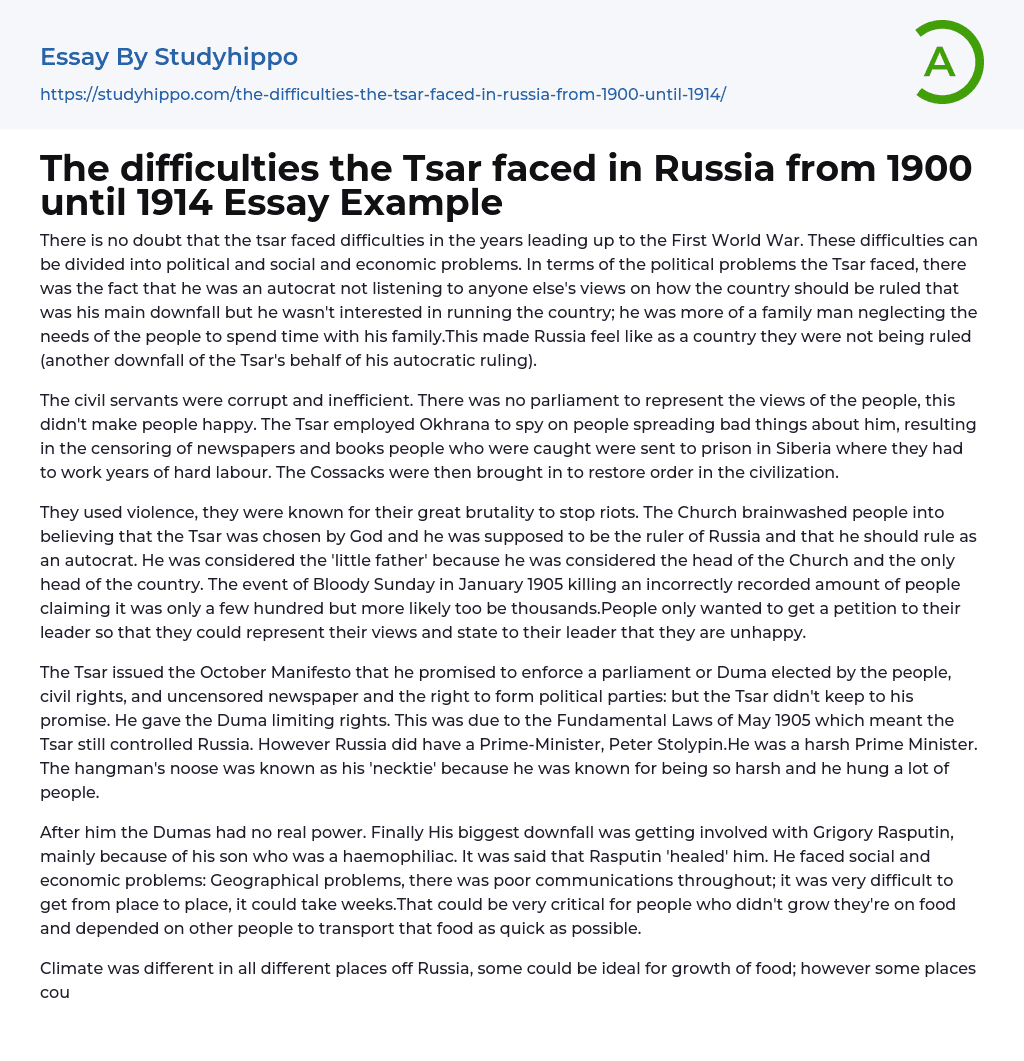

The difficulties the Tsar faced in Russia from 1900 until 1914 Essay Example
There is no doubt that the tsar faced difficulties in the years leading up to the First World War. These difficulties can be divided into political and social and economic problems. In terms of the political problems the Tsar faced, there was the fact that he was an autocrat not listening to anyone else's views on how the country should be ruled that was his main downfall but he wasn't interested in running the country; he was more of a family man neglecting the needs of the people to spend time with his family.This made Russia feel like as a country they were not being ruled (another downfall of the Tsar's behalf of his autocratic ruling).
The civil servants were corrupt and inefficient. There was no parliament to represent the views of the people, this didn't make p
...eople happy. The Tsar employed Okhrana to spy on people spreading bad things about him, resulting in the censoring of newspapers and books people who were caught were sent to prison in Siberia where they had to work years of hard labour. The Cossacks were then brought in to restore order in the civilization.
They used violence, they were known for their great brutality to stop riots. The Church brainwashed people into believing that the Tsar was chosen by God and he was supposed to be the ruler of Russia and that he should rule as an autocrat. He was considered the 'little father' because he was considered the head of the Church and the only head of the country. The event of Bloody Sunday in January 1905 killing an incorrectly recorded amount of people claiming it was onl
a few hundred but more likely too be thousands.People only wanted to get a petition to their leader so that they could represent their views and state to their leader that they are unhappy.
The Tsar issued the October Manifesto that he promised to enforce a parliament or Duma elected by the people, civil rights, and uncensored newspaper and the right to form political parties: but the Tsar didn't keep to his promise. He gave the Duma limiting rights. This was due to the Fundamental Laws of May 1905 which meant the Tsar still controlled Russia. However Russia did have a Prime-Minister, Peter Stolypin.He was a harsh Prime Minister. The hangman's noose was known as his 'necktie' because he was known for being so harsh and he hung a lot of people.
After him the Dumas had no real power. Finally His biggest downfall was getting involved with Grigory Rasputin, mainly because of his son who was a haemophiliac. It was said that Rasputin 'healed' him. He faced social and economic problems: Geographical problems, there was poor communications throughout; it was very difficult to get from place to place, it could take weeks.That could be very critical for people who didn't grow they're on food and depended on other people to transport that food as quick as possible.
Climate was different in all different places off Russia, some could be ideal for growth of food; however some places could be so cold that they're inhabitable. There was a great divide between rich and poor people because they were socially divided. They were either middle and upper class or peasants who supported the whole country. Many
people lost out when Stolypin came into parliament.
Some went to Siberia but found that land was already taken. This meant there were peasant families having to suffer because they could not grow the food to eat. After 1910 the average wages had decreased to below the average wage of 1903. Consequences this led to was the Lena Goldfields massacre of strikers protesting about the working conditions, low wages and the working day hours (5.
00a. m-7. 00p. m). They clashed with troops and many workers were killed.
This massacre had the same effects of Bloody Sunday. This started more and more workers' protests.
- Federal government essays
- Armed Forces essays
- Confederate States Of America essays
- Federal Government Of The United States essays
- Fourteenth Amendment To The United States Constitution essays
- Governance essays
- Parliament essays
- Politics essays
- Jurisdiction essays
- Bureaucracy essays
- Separation Of Powers essays
- Congress essays
- President essays
- United States Congress essays
- Non-Commissioned Officer essays
- Appeal essays
- Revenge essays
- Corporate Governance essays
- Public Service essays
- Income Tax essays
- Supply essays
- Red Cross essays
- Democracy essays
- State essays
- Liberty essays
- Absolutism essays
- Reform essays
- Republic essays
- John Marshall essays
- Bourgeoisie essays
- Developed Country essays
- Elections essays
- International Relations essays
- Left-Wing Politics essays
- Monarchy essays
- Political Corruption essays
- Political Party essays
- Political Science essays
- Sovereign State essays
- United Nations essays
- World Trade Organization essays
- Contras essays
- Dictatorship essays
- Foreign policy essays
- Monarch essays
- Corruption essays
- Foreign essays
- Democratic Party essays
- European Union essays
- President Of The United States essays



